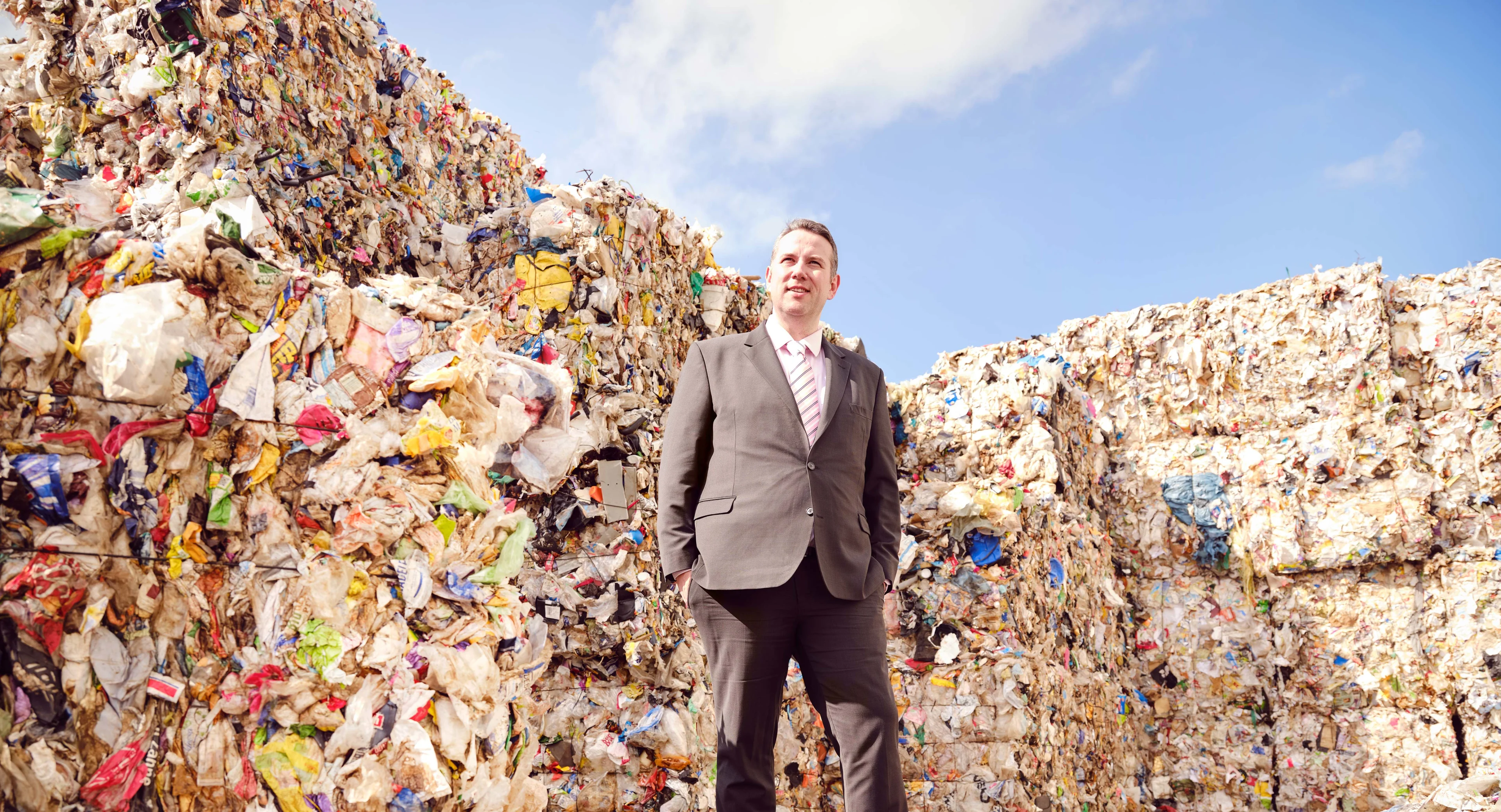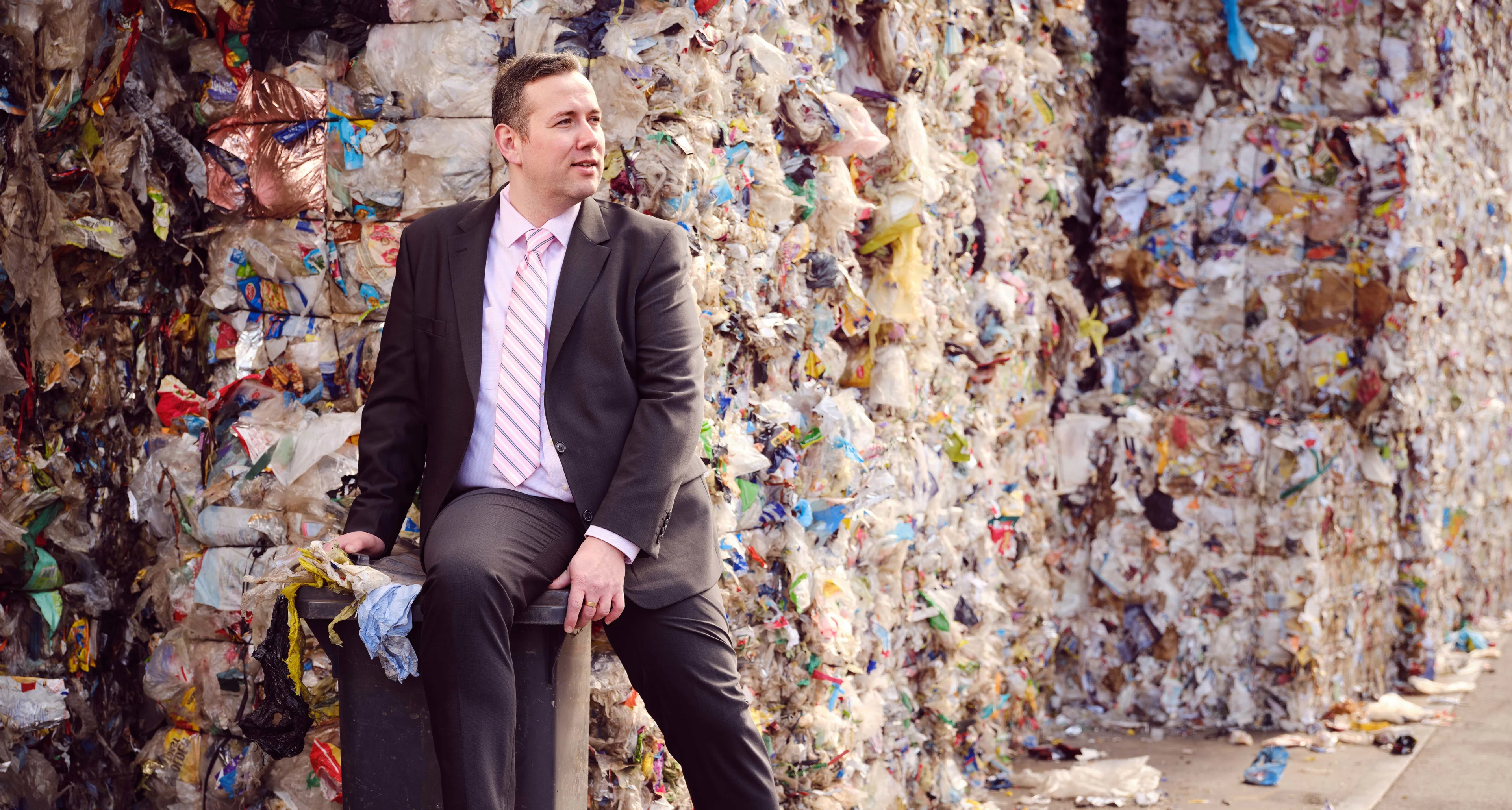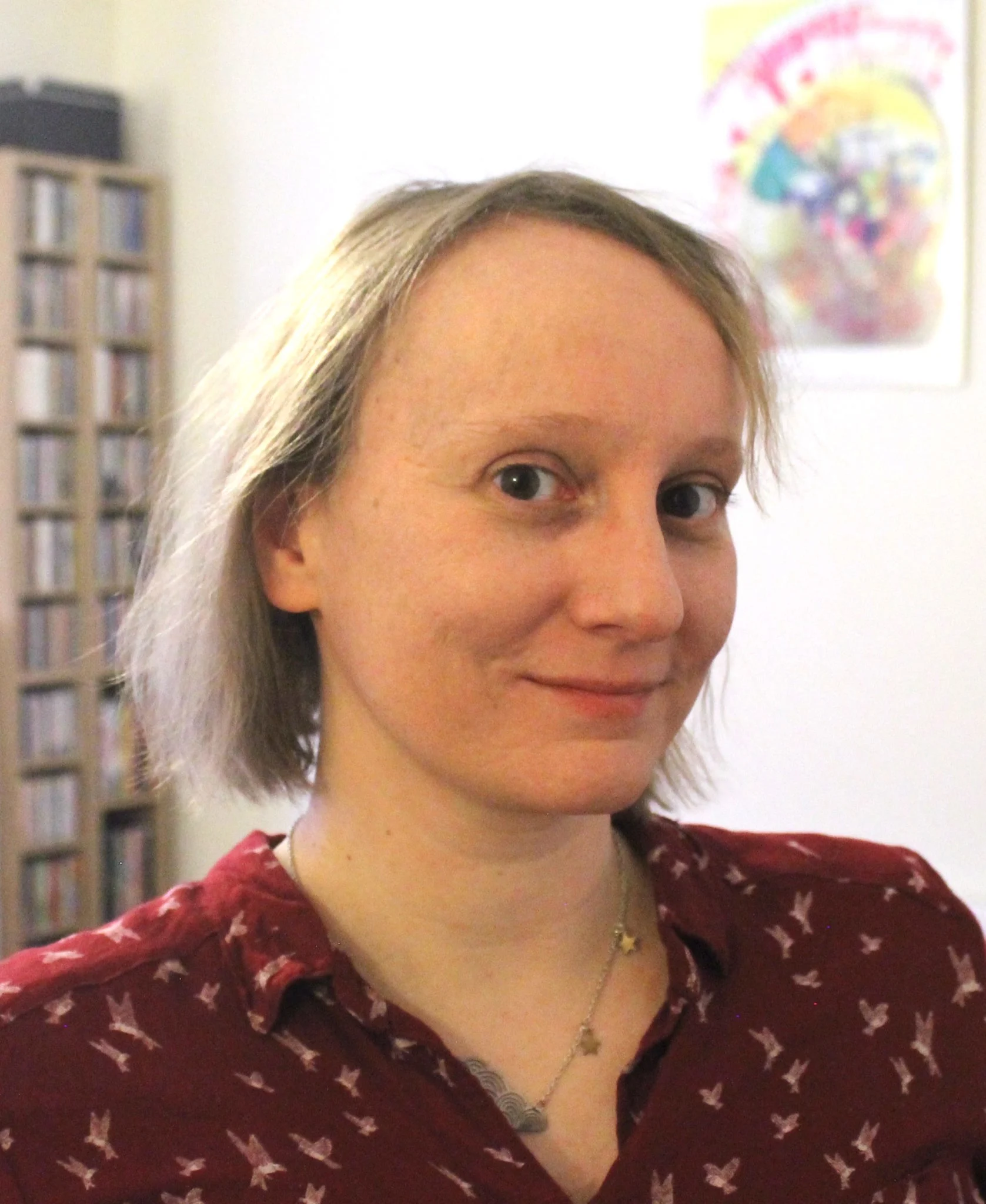
Circular economy
13 minute read
The Brave and the innovative: The disruptive mission of Stephan Krueger
The German manager’s team is about to change the future of plastics recycling. He wants to disrupt the industry and challenge its very logic. Stephan Krueger sees recycling not as a solution for our plastic waste problem, but as a whole new raw material.
Stephan Krueger can recognize which plastic is which from the sound it makes when it falls on the floor; from seeing how it floats in water; by its smell when it burns. He is quick to point out that he’s not the only one who has these skills. In fact, throughout our conversation, he emphasizes that he is just one of the many people working in the frontline of the plastics industry, and that changing the future of plastics recycling is not the preserve of lone thinkers, but a team effort.
Just as he likes to get up close and personal with different plastic materials, Krueger is a man who prefers to conduct his meetings in person. Meetings is what much of his job revolves around, he says. And these meetings – with businesses whose plastic waste could serve as feedstock for Neste’s emerging chemical recycling project – are at the cutting edge of where we are heading, as a world seemingly wedded to plastics, but committed to reducing waste, fossil oil usage, and plastic pollution. Krueger says he likes to meet because he wants to personally check the material they’re discussing; but also because in-person conversations are where Krueger thinks he makes the best work connections.
Mindful of our combined footprint, we meet by video for the interview one grey spring morning in London and Düsseldorf. Krueger is no stranger to long-distance communication methods either. With family in China and business partners across several countries, Krueger takes a global approach to everything. For a field like plastics waste management, that global view is very much needed, because a decision in one country can affect recycling processes halfway around the world.
When the world changed fast
In 2017, China announced that it would stop the import of plastic waste from other countries by 2018. This decision had a huge impact on the global recycling industry, but also on Krueger’s career. “I was thinking that I might have to leave China – and leave the recycling industry.” At the time, he was sourcing waste plastics from different industries to sell them to mechanical recycling facilities in Europe and also in China. “To be honest, I think I was part of the problem,” says Krueger. “We just collected everything, put it into the container and sent it to them.”
By providing feedstock ready for recycling in China, we prevented them from even thinking about arranging the collection and recycling of their own domestic waste.
China had tried for a whole decade to control waste imports but was unable to put a stop to the dirty waste shipments. The processing of plastic waste generated high environmental damage as recycling facilities operated mostly illegally, pretending to follow the rules. Finally the decision was made that only a total closure will prevent further harm.
“By providing feedstock ready for recycling in China, we prevented them from even thinking about arranging the collection and recycling of their own domestic waste.” And that is important to realize, says Krueger. When we hear about plastic waste in the ocean at the other end of the world, that is not unrelated to what happens in Europe. Shortly after the steady stream of plastic waste from Europe stopped, China immediately began collecting their own waste for recycling. Krueger says that’s characteristic for the country. “What I like about China is when they decide to do something, it happens relatively fast.”
The man who knows everything about plastics
Fast-paced decision-making appeals to Krueger, a man described by his colleagues as “an active networker, and instinctively curious”.That curiosity pushed him from university into a career in the paper recycling business in 1998, where he began learning about logistics and recycling from the inside. That same curiosity pushed him to take on more responsibilities, to learn, and to develop. Soon he was responsible for waste paper export from Germany to Indonesia and China, at about 20,000 tonnes per month. It also led to his interest in languages; in addition to his native German, Krueger speaks fluent English but communicates in French and Mandarin Chinese as well.
The sign on my door that said Krisenmanagement
At the same time, he was doing feedstock sourcing, sales, documentation and other tasks all by himself and often had to work 16-hour days. “I had a sign on my door that said Krisenmanagement,” he laughs. It means crisis management – because there were constant issues I had to solve. It was meant as a joke, but in some way, it was true, too.” In 2006 Krueger made the move from paper to plastics, initially at a Dutch company which was especially strong in the PET recycling business. At that time, about 80 percent of bottles from PET plastic (or polyethylene terephthalate) from Europe were sent to China to be mechanically recycled, for example into polyester fibers for fleece clothing. This was to be Krueger’s induction into the material that’s come to define our age – plastics – and he was voracious in his appetite to learn. He excitedly describes how he spent the first two months experimenting and learning all about different types of plastic. “I learned how different plastics smell, or how they smoke when they burn, how they sound when they fall on the floor; what happens when you scratch them or put them in water,” he says. “ I would say I have a personal relationship with plastics.”
The link between Europe and China
This close knowledge of plastic helped him out many times. “You could not always trust plastic waste providers who told you ‘I have this material. Would you buy it?’ I always went there to have a look, and it was often different from what they claimed.” For about twelve years, Krueger bought and sold waste plastics across several European countries, to sell to European and mainly to the Chinese recyclers. He visited suppliers, scratched and smelled plastics, and made quick decisions – the way, he says, that he likes doing business.
Sometimes when we were out at night, I could distinguish the smells of different plastic types burning.
He had grown fond of China, too. But meanwhile, the plastic waste import was saddling China with large amounts of plastic. Not all of it was fully suitable for recycling, and the facilities were overwhelmed. “I lived in Tianjin for a year,” he recalls. “And sometimes, when we were outside in the night, I could distinguish the smells of different plastic types burning.” The need for change was, literally, in the air. China’s plastic ban had major consequences for Europe. “Half of our recycling capacity vanished between December 31st 2017 and January 1st 2018. I find it almost funny that basically at the same time China announced they’re closing the doors to plastic waste, the European Union announced their new recycling targets; especially as recycling in China contributed to the European recycling rates.”
By the year 2030, the EU plans to recycle 55 percent of plastic packaging waste. It’s an ambitious goal, and would require a quadrupling of Europe’s current mechanical recycling facilities. Krueger is convinced that expansion wouldn’t be reached in time. “I know for myself, that if I have targets I know I can’t reach, I might give up. I think it would be better to give people more realistic targets to strive for.” According to Krueger, mechanical recycling alone will not be enough to meet the EU’s target, but perhaps we have a chance if we combine forces with the rapidly growing field of chemical recycling. Neste’s work in plastics stems from its mission to create new, more sustainable solutions that reduce our reliance on crude oil. And its work in recycling plastic is an intriguing and timely part of the mix. Plastic is composed of hydrocarbons, so for Neste, it’s a case of looking at how plastic waste can be turned back into raw material. Neste is now playing its part in the creation of an exciting new industry – a new, more sustainable plastic economy, with chemical and mechanical recycling working side by side.
Disrupting the recycling industry
Just as the new Chinese waste plastics ban was about to significantly impact his career, Krueger was recruited to Neste’s chemical recycling project, where he helps source plastic waste to be chemically converted into raw materials. “I had no idea of Neste,” he recalls. “But I knew about chemical recycling and saw that as a chance. Initially I was thinking: Are they really believing in what they are doing? And they clearly are.” For the first year, he upped sticks to Espoo, working in Neste’s office in Finland; then the Düsseldorf office opened, and Krueger moved with it. Coming from the recycling world, Krueger admits that he experienced a slight culture shock. In his first year at Neste, he realized that everyone had their focus on the long term. As he was part of a team creating a new solution for the plastic waste problem, it was not a sprint with a sequence of quick decisions, and he had to adapt to the pace of strategies and R&D efforts. And that wasn’t the only difference.
I am the interpreter between two groups – recycling and refinery
“I realized that I'm also speaking a totally different language. It was not easy to understand the refinery side, and to let them understand the recycling side. Sometimes it sounds like we are speaking the same language, but we’re actually talking about different things.” But in a world that is keyed up to building a loop where new, fossil-based raw material would no longer be needed for the production of plastics, and where mechanical and chemical recycling processes work together, making sure that the plastic we’ve once produced is maximally reused in the production of new plastic, it is vitally important that the refining and recycling experts work closely together. And once Krueger got the hang of the differences between the languages, he quickly found his niche. “I see myself as a kind of interpreter between these two groups – recycling and refinery.”
At the time I didn’t think the talk about creating a healthier planet was sincere. I thought it was marketing.
Krueger also had to get used to Neste’s ideals and philosophy. “Every presentation started with ‘We want to create a healthier planet for our children’. To be honest, at the time I joined I didn’t know if it was sincere. I thought it was marketing.” Even from his pragmatic point of view, it was clear that the recycling industry needed to change drastically. “I think mechanical recycling still sees chemical recycling as competition, but the two are actually complementary.” Not all materials can be recycled mechanically, and chemical recycling – once it runs at an industrial scale – could process some of those plastics and turn them into raw material for new products. Chemical recycling would also extend the life of plastics that do go through mechanical recycling. “Mechanical recycling can only recycle one plastic material a few times ,” says Krueger. “With chemical recycling – chemically or thermochemically processing waste plastic into raw material – we will be able to re-animate it. That material becomes a new plastic that can be mechanically recycled after use. In this way chemical recycling becomes part of the cycle – it closes the loop for those plastic materials that have been, thus far, impossible to recycle.”

The recycling industry needed to change drastically. “I think mechanical recycling still sees chemical recycling as competition, but the two are complementary.
Getting chemical recycling to the scale where it can become part of the plastics recycling process requires collaboration between people from different industries – refinery and recycling – from different countries, and with different viewpoints. That’s where Krueger thrives, and takes on his role as a disruptor. “Many people see a difference in ideas as a disruption, but I like disruption. Whenever possible I try to bring up different perspectives because I think we need to have input from all sides. This is especially true when we’re building up a new system into the recycling economy, like we are with chemical recycling.”
Changing the way we think about plastic waste
But recycling also needs a change in philosophy. The mantra often linked to the recycling industry – which Krueger is slightly embarrassed to admit he also followed for a while – was, “One man’s waste is another man’s raw material.” He no longer thinks that way, and even sounds slightly frustrated when he recounts how a company recently asked him what they needed to do in order for their products to be chemically recycled. “I said, what you need to do is prevent your products from ending up in chemical recycling.” Once chemical recycling is running at scale, Krueger would like companies to choose chemically recycled materials as feedstock for production – not think of their waste as input for the process.
Krueger sees a future where people can’t even imagine there was ever plastic waste in the oceans.
Everyday consumers need to change their mindset as well, and that is a topic close to Krueger’s heart. “There's still not enough education about this,” he says ardently. “My son’s school has no discussion about how to deal with waste responsibly in your daily life. It's not a part of the school system.” But Krueger is optimistic. He sees a future where people can’t even imagine there was ever plastic waste in the oceans. “Everyone will say ‘How crazy is this? We can still make new plastic out of that!’” Needless to say, he is now fully embracing Neste’s purpose, creating a healthier planet for our children. “This is not just marketing – I can vouch for that – but it's really what we believe we can do.” “When I joined Neste, I saw it as a way to stay in the recycling industry by using a different approach. But now, I really see what is happening with the planet. And I know that I can be part of improving things. But I cannot do this alone, that's for sure.” Luckily, he isn’t alone. With his team at Neste, and connections across the broader mechanical and chemical recycling industries, Krueger is part of a collaborative effort to change the way we handle – and think about – plastic waste. And even though it was always a team effort, Krueger is proud to claim a part of it. “To be honest, I would like to end my career by being able to tell my grandchildren, ‘Look, this is chemical recycling. And I was one of the ones who helped develop this.’”
Credits: Dr. Eva Amsen, a science writer and communicator whose work has appeared on Forbes, Nautilus and The Scientist. Twitter
Pictures: Per Schorn
